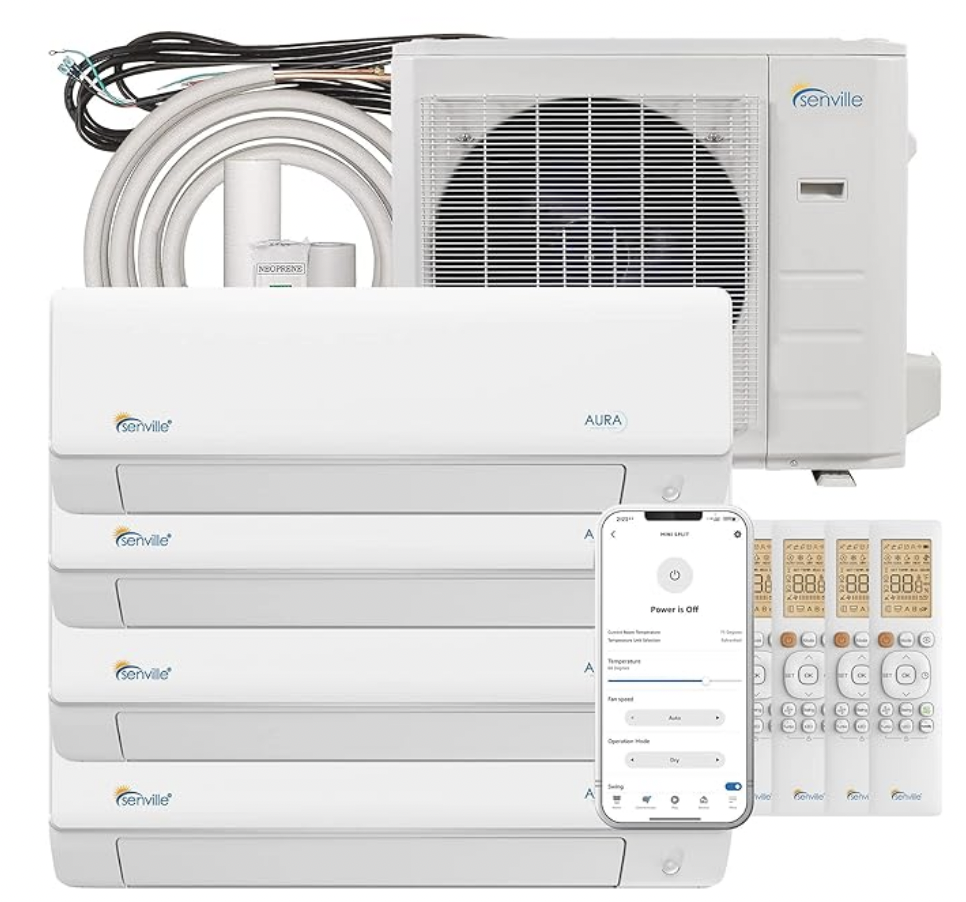When it comes to choosing an air-source heat pump for your home, the decision between Senville and York can be a challenging one. Both brands offer a range of ducted and ductless (mini-split) systems, each with their own unique features and performance characteristics. In this comprehensive guide, we’ll dive deep into the technical specifications and hands-on considerations to help you determine which brand is the better choice for your DIY project.
Ducted Air-Source Heat Pumps
Efficiency Ratings
- Senville ducted heat pumps typically have SEER (Seasonal Energy Efficiency Ratio) ratings ranging from 16 to 22, while York models can reach up to 20 SEER.
- Higher SEER ratings indicate more efficient operation, leading to lower energy bills and a smaller environmental impact.
- To maximize efficiency, ensure proper duct sizing and insulation, as well as correct refrigerant charge and airflow.
Heating and Cooling Capacity
- Senville offers ducted heat pumps with capacities ranging from 1.5 to 5 tons, suitable for homes up to 2,500 square feet.
- York’s ducted heat pump lineup covers 2 to 5 ton capacities, catering to homes up to 3,000 square feet.
- When selecting the right capacity, consider factors like home size, insulation, and climate to ensure optimal performance and comfort.
Noise Levels
- Senville ducted heat pumps typically operate at 55-65 dB(A) for the outdoor unit and 35-45 dB(A) for the indoor unit.
- York’s ducted models generally range from 57 to 68 dB(A) for the outdoor unit and 38 to 50 dB(A) for the indoor unit.
- Lower noise levels are preferred for a more peaceful home environment, especially in bedrooms and living areas.
Installation Considerations
- Senville ducted heat pumps may require more extensive ductwork modifications, as they often use a different refrigerant (R410A) compared to older systems.
- York ducted heat pumps can be more straightforward to install, as they may be compatible with existing ductwork and use the more common R-22 or R-410A refrigerants.
- Proper installation is crucial for optimal performance and safety, so it’s recommended to hire a licensed HVAC contractor for both Senville and York systems.
Ductless (Mini-Split) Air-Source Heat Pumps

Energy Efficiency
- Senville ductless mini-splits typically have SEER ratings ranging from 18 to 22, while York’s ductless models can reach up to 21 SEER.
- Higher SEER ratings translate to lower energy consumption and utility bills, making them an attractive option for energy-conscious homeowners.
Heating and Cooling Capacity
- Senville ductless mini-splits are available in capacities from 9,000 to 36,000 BTU/h, suitable for spaces from 300 to 1,500 square feet.
- York’s ductless lineup covers 9,000 to 42,000 BTU/h, accommodating homes from 400 to 2,000 square feet.
- Carefully match the mini-split capacity to the size of the space to ensure optimal performance and comfort.
Noise Levels
- Senville ductless indoor units operate at 19-52 dB(A), while the outdoor units range from 52 to 60 dB(A).
- York’s ductless mini-splits have indoor unit noise levels of 22-50 dB(A) and outdoor unit noise levels of 55-60 dB(A).
- Lower noise levels are preferred, especially for bedrooms and living areas, to create a more peaceful environment.
Installation Complexity
- Senville ductless mini-splits generally require less invasive installation, as they only require a small 3-inch hole in the wall for the refrigerant lines.
- York ductless systems may require more extensive wall modifications, as the refrigerant lines need to be routed through the wall, which can be more challenging for DIY projects.
- Proper installation, including refrigerant charging and electrical connections, is crucial for both Senville and York ductless systems to ensure safe and efficient operation.
Unique Considerations
User Experience and Technical Skills
- According to user feedback, Senville’s ductless mini-splits have been reported to have some reliability issues, such as coil leaks, which may be a concern for DIY users.
- York, on the other hand, is a well-established brand with a reputation for reliable HVAC equipment, which may be a more appealing option for DIY users with less technical expertise.
- However, it’s important to note that proper installation and maintenance are crucial for the longevity and performance of any HVAC system, regardless of the brand.
Warranty and Customer Support
- Senville offers a 5-year warranty on their compressors and a 1-year warranty on other components, which may be shorter than some competitors.
- York provides a 10-year warranty on their compressors and a 5-year warranty on other parts, which can provide more peace of mind for homeowners.
- Additionally, the availability and responsiveness of the brands’ customer support can be a significant factor in the overall user experience.
In conclusion, when comparing Senville and York for your DIY air-source heat pump project, it’s essential to consider a range of technical specifications, installation factors, and user experiences. While there is no clear-cut winner, the decision ultimately depends on your specific needs, budget, and technical expertise. Carefully evaluate the features, efficiency ratings, and installation requirements of both brands to make an informed choice that best suits your home and DIY capabilities.
